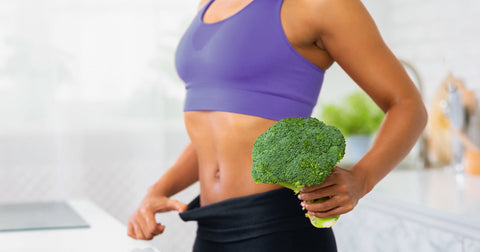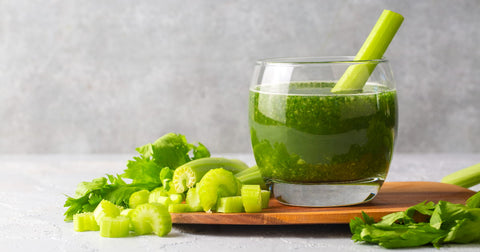Broccoli, that vibrant green vegetable often praised for its versatility and nutritional value, has become a staple in many health-conscious diets. But beyond its reputation as a superfood, you might be wondering: Is broccoli truly good for weight loss?

This article delves into the world of broccoli, exploring its potential benefits for weight management, its impressive nutritional profile, and how it can be incorporated into a balanced diet. We'll also discuss the importance of understanding food intolerances and how our food sensitivity test kit can help you optimize your digestive health.
Is Broccoli Good for Weight Loss?
Yes, broccoli can be a valuable addition to a weight loss plan. Its impressive nutritional profile contributes to various factors that support weight management:
-
Low in Calories: Broccoli is extremely low in calories, with only about 31 calories per cup of chopped florets. This makes it a great choice for those looking to reduce their calorie intake without feeling deprived.
-
High in Fiber: Broccoli is a good source of fiber, which promotes feelings of fullness and satiety, helping you manage your appetite and avoid overeating.
-
Nutrient-Dense: It's packed with essential vitamins, minerals, and antioxidants that support overall health and well-being.
-
May Boost Metabolism: Some compounds in broccoli might have a positive impact on metabolism, potentially aiding in weight loss efforts.
Broccoli Nutrition: A Closer Look
Broccoli is a nutritional powerhouse, offering a wide range of essential nutrients:

-
Vitamin C: A potent antioxidant that supports immune function and skin health.
-
Vitamin K: Essential for blood clotting and bone health.
-
Folate: Important for cell growth and development, especially during pregnancy.
-
Fiber: Promotes digestive health and helps regulate blood sugar levels.
-
Potassium: An electrolyte that helps regulate blood pressure and fluid balance.
-
Sulforaphane: A compound with potential anti-cancer and anti-inflammatory properties.
How Many Carbs are in Broccoli?
Broccoli is relatively low in carbohydrates. One cup of chopped broccoli contains about 6 grams of carbohydrates, making it a suitable choice for those following low-carb or ketogenic diets.
Can You Eat Raw Broccoli?
Yes, you can eat raw broccoli. It's often enjoyed in salads, crudités platters, or as a healthy snack. However, some people might find raw broccoli harder to digest than cooked broccoli.
Broccoli Benefits for Male: Prostate Health and Beyond
While broccoli offers numerous health benefits for everyone, it might provide specific advantages for men:

-
Prostate Health: Some studies suggest that the sulforaphane in broccoli might help protect against prostate cancer.
-
Heart Health: Broccoli's fiber and potassium content can contribute to heart health.
-
Energy Levels: The B vitamins and iron in broccoli can help boost energy levels and combat fatigue.
Food Intolerance and Broccoli: A Potential Concern
While broccoli is generally a healthy food, some individuals might experience digestive issues after consuming it. This could be due to:
-
High Fiber Content: Broccoli is a cruciferous vegetable, and cruciferous vegetables are known to cause gas and bloating in some people due to their fiber content and certain sugars.
-
Food Intolerance: A sensitivity or intolerance to broccoli or other cruciferous vegetables can also trigger digestive symptoms.
Food Sensitivity Test Kit: Identify Your Triggers
If you experience digestive discomfort after eating broccoli or other foods, consider taking a food sensitivity test kit. This can help you identify specific foods that might be triggering your symptoms, allowing you to make informed dietary choices and improve your gut health.
Key Takeaways:

-
Broccoli is a nutritious and versatile vegetable that can support weight loss and overall health.
-
It's low in calories, high in fiber, and packed with essential vitamins and minerals.
-
If you experience digestive issues after consuming broccoli, consider a food sensitivity test to identify potential food intolerances.
Remember, this article is intended for informational purposes only and should not be considered a substitute for professional medical advice. If you have any concerns about your health or dietary choices, consult a qualified healthcare professional.
Frequently Asked Questions:
1. What are some ways to cook broccoli that might make it easier to digest?
Steaming, roasting, or stir-frying broccoli can help break down some of its fiber, making it gentler on your digestive system. You can also try adding spices like ginger or turmeric, which have anti-inflammatory and digestive properties.
2. Can I eat broccoli raw?
Yes, you can eat broccoli raw, but some people find it harder to digest than cooked broccoli. If you choose to eat it raw, try chopping it finely or massaging it with lemon juice or olive oil to soften the fibers.
3. How much broccoli should I eat per day?
A serving of broccoli is typically about 1 cup of chopped florets. It's best to incorporate broccoli as part of a balanced diet with a variety of vegetables. If you experience digestive discomfort after eating broccoli, adjust your intake accordingly.
4. I have irritable bowel syndrome (IBS). Can I still eat broccoli?
Broccoli is a high-FODMAP food, which means it can trigger symptoms in some people with IBS. If you have IBS, it's best to start with small portions of well-cooked broccoli and monitor your body's response.
5. I'm experiencing bloating and gas after eating broccoli. Could it be a food intolerance?
Yes, it's possible to have a food intolerance or sensitivity to broccoli or other cruciferous vegetables. If you experience digestive discomfort after consuming broccoli, consider a food sensitivity test to identify potential triggers and make informed dietary choices.


.png?v=1737390083)
.png?v=1737187409)


